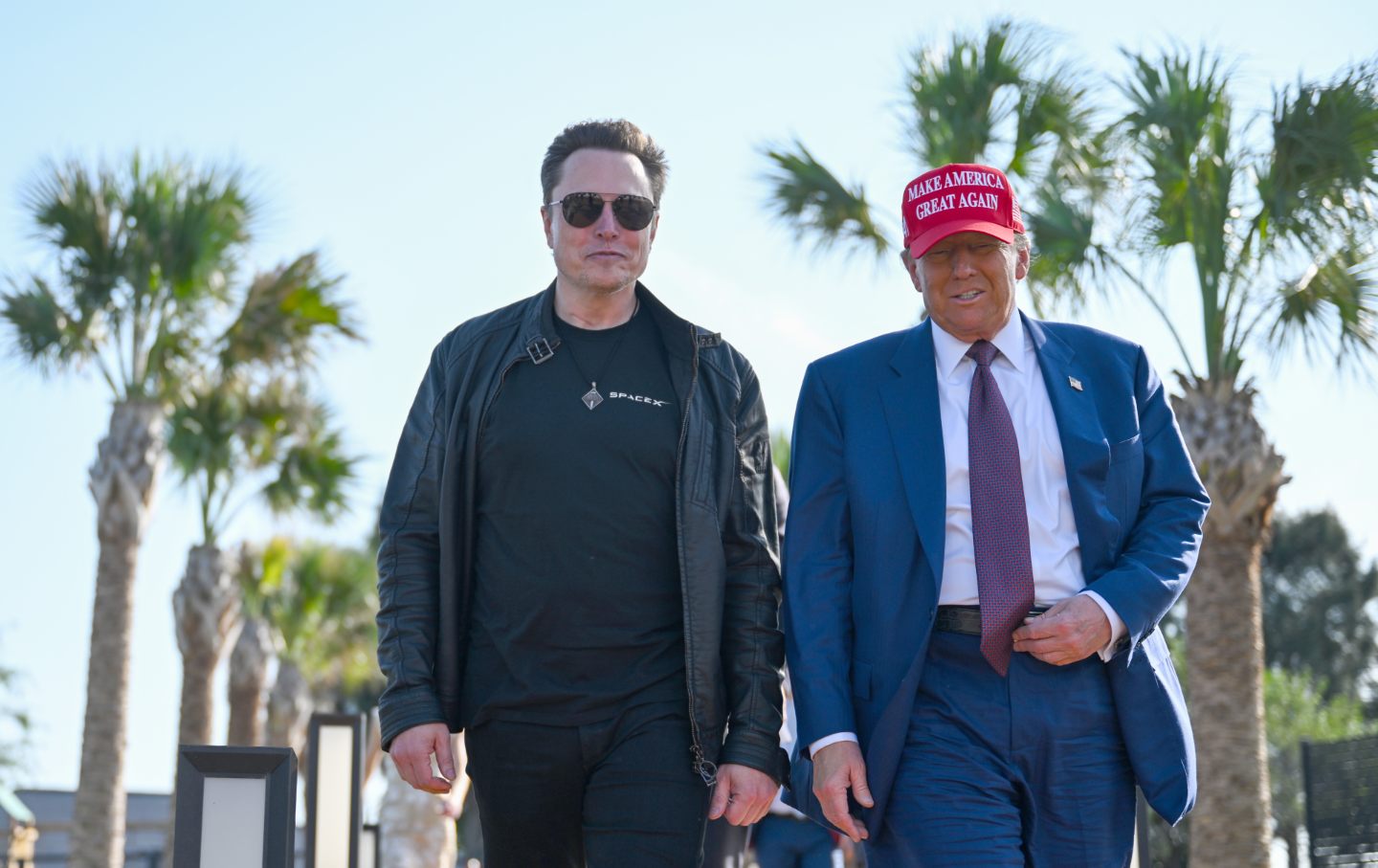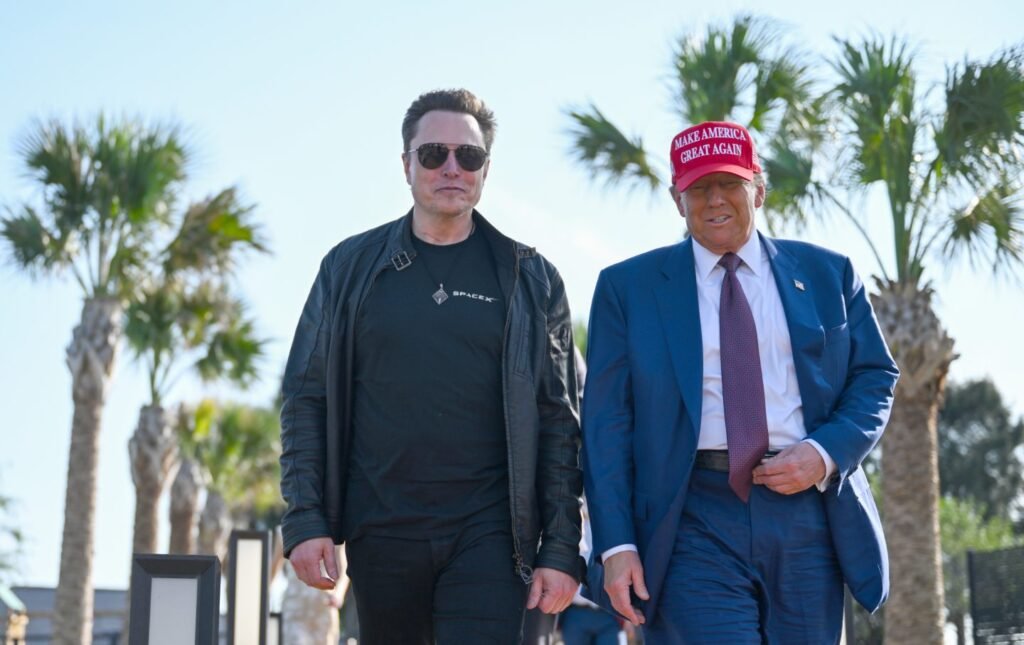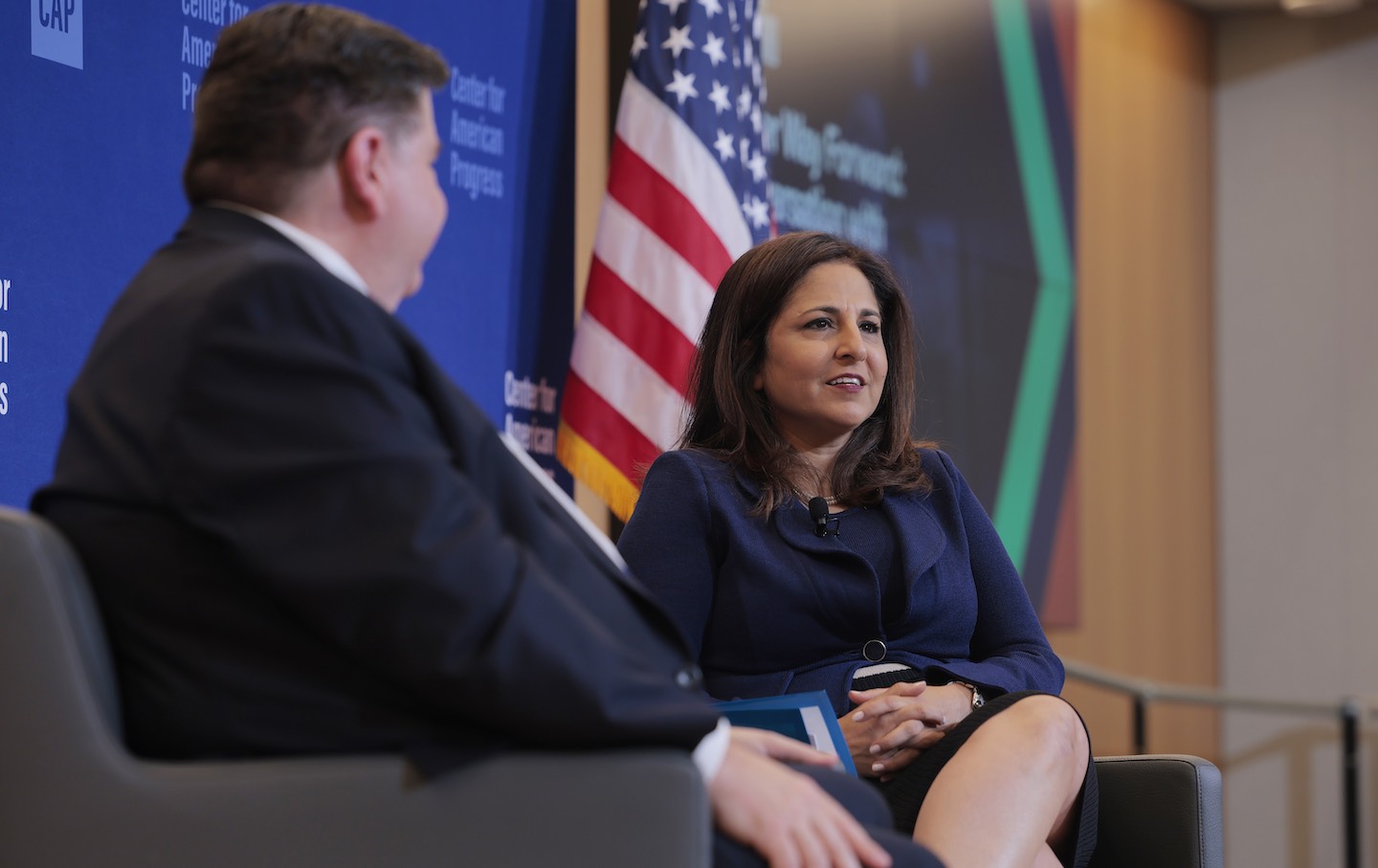March 19, 2025
The racist tinge to Elon Musk’s hacking of the government eerily reflects cyberpunk’s vision of the future—especially the science fiction coming out of South Africa.

President-elect Donald Trump with Elon Musk at a launch of a test flight of the SpaceX rocket in Brownsville, Texas.
(Brandon Bell / Getty Images)
This article originally appeared at TomDispatch.com. To stay on top of important articles like these, sign up to receive the latest updates from TomDispatch.com.
The opening weeks of the second Trump administration have produced daily headlines that read — no, this is not hyperbole! — like science fiction. The spectacle of a South African tech billionaire and his cronies staging a twenty-first-century cybercoup with the acquiescence of an aging lunatic of a president beggars belief. Elon Musk has given vast powers to young, even teenaged plenipotentiaries like Edward “Big Balls” Coristine, 19, who had earlier been employed by Musk’s brain-chip project Neuralink and has now been made a special adviser to the State Department’s Bureau of Diplomatic Technology and the Department of Homeland Security. The Trumpian lists of forbidden words and concepts have reminded some observers of George Orwell’s dystopian novel 1984.
High Technology and Squalor
Insights into our present crisis, however, are also offered by science fiction novels that, over the decades, imagined artificial intelligence, brain-Internet interfacing, the decline of the state in the face of tech corporations, and the development of largescale digital systems and ways they might be hacked. Such works coalesced into the cyberpunk school of sci-fi writing in the 1980s and 1990s. Heirs to that tradition like novelist William Gibson may now be seen as the reluctant prophets of — yes! — Elon Musk’s invention of a new Department of Government Efficiency or DOGE for the second Trump era.
Cyberpunk has especially resonated in South Africa, its themes explored by authors like Lauren Beukes, whose 2008 novel Moxyland is set in a futuristic Cape Town that labors “under a tyrannical and vigilant government and media.” As she explained, “I’m always writing from that perspective of growing up under what was a utopia for me and a repressive violent state that destroyed lives and futures for Black people when the racist government wasn’t actively murdering them.” Cyberpunk themes have also deeply shaped video games like Canadian-South African director Neill Blomkamp’s Off the Grid, in which Mega Corporations are pitted against one another in a contest for dominance.
The racist tinge to Donald Trump’s and Elon Musk’s ongoing hacking of the government should also bring to mind Blomkamp’s 2009 “first contact” movie, District 9, which highlighted the determination of White nationalists to cannibalize the resources of populations who had been marginalized precisely to make them vulnerable enough to be looted. With its simultaneous depiction of high-tech wonders and social squalor and its foregrounding of corporate rather than state power, District 9 also has significant cyberpunk themes.
On January 31st, as the Center on Budget and Policy Priorities (CBPP) noted, leaks from the Treasury Department revealed that high-ranking government employees were mounting resistance to ad hoc DOGE head Elon Musk’s demands that his team of young hackers be given entry to the financial-transaction systems managed by the Bureau of the Fiscal Service (BFS). That’s the unit that makes virtually all government payments, control of which amounts to control of the government. It soon became clear that DOGE operatives had indeed been given authorization to access BFS platforms. As a result, Elon Musk, the CE0 of three private corporations, has gained the ability to oversee government financial transactions (with no questions asked about how he might use the information obtained to enrich himself or harm competitors).
By mid-February it was clear that one of Musk’s acolytes, 25-year-old Marko Elez, had for some time obtained overwrite privileges at the BFS — power, that is, to override the entire federal budget, if he (and Musk) wished to. Elez briefly felt he had to resign due to past messages on social media boasting of his racism, including his advocacy for “Indian hate.” His cause was nevertheless adopted by Vice President JD Vance (whose wife Usha is, ironically enough, from India). For right-wing movements, whipping up hatred of racialized minorities is crucial to getting into and staying in power, and disciplining Elez would have undermined Vance’s project — in comparison to which his wife’s honor is apparently of little interest to him. You undoubtedly won’t be surprised to learn that Elez was soon reinstated.
Overwrite Privileges
Musk maintains that he’s reducing government waste by capturing the Treasury Department infrastructure and arbitrarily firing large numbers of government workers. He essentially abolished by fiat the U.S. Agency for International Development, the main government distributor of aid globally, which he bizarrely characterized as a “criminal” organization and the employees of which he called “worms.” He abruptly cut off its field agents in dangerous areas like the Congolese capital Kinshasha from their email access and funds to escape a potentially hazardous situation.
Nor was that agency the only object of his ire. In his view, vast swathes of the government are unnecessary and wasteful. No matter that his own companies have fed from the public trough to the tune of nearly $21 billion dollars since 2008 and his DOGE team has been enormously wasteful and dangerous. For example, they fired hundreds of personnel at the Department of Energy’s National Nuclear Security Administration who oversee the country’s nuclear arsenal. When the Gen Z DOGE ninjas finally thought better of it, they couldn’t immediately rehire the experts since they didn’t have their personal emails and had already abruptly closed their government accounts.
As though intent on causing serial catastrophes for the United States, Trump and his crew then began firing employees of the Federal Aviation Agency without whom air traffic controllers say they cannot do their work. They appear to have done keyword searches for “probationary” employees of the agency whom they let go en masse, unaware that the term has a technical meaning in government. A newly promoted FAA employee with a high level of irreplaceable technical knowledge would still be “probationary” for one month.
And here’s the reality of our governmental moment in the second age of Donald Trump: rather than cutting governmental fat, the president and DOGE are excising sinew and bone, amputating limbs from key public agencies like the National Institutes of Health (NIH). After all, every $100 million of funding for NIH-supported research (often at universities) generates some 76 patents. In turn, such breakthroughs can generate as much as $600 million in continuing research and development funds. Cuts to overhead at universities hosting NIH research threaten to bankrupt the country’s network of unparalleled research universities, setting the U.S. farther behind in a race to innovate in which China has already taken the lead. The DOGE cowboys may tell themselves that private industry will take up the slack, but (bluntly put) that’s a libertarian fairy tale.
Cyber Capital
The tech-bro oligarchy’s rise to power is intimately connected with profound changes in America’s political economy. This country has always had a capitalist system, but it has taken radically different forms over time. Each of those forms has had a strong racial dimension. Today, cyber capital seems in the process of becoming dominant, driven by the Internet and large language models (misnamed “artificial intelligence”). The digital economy now represents 12% of gross domestic product (GDP), more than industry, and from 2017 to 2021 it grew seven times as fast as the rest of the economy. It is also giving a fillip to American trade. In 2022, government data indicated that “while U.S. real GDP grew by 1.9 percent, the U.S. digital economy real value added grew by 6.3 percent driven primarily by growth in software and telecommunication services.”
This development was foreseen by cyberpunk authors like Gibson whose 1984 novel Neuromancer is soon to be an Apple TV serial. His hacker hero, Henry Dorsett Case, takes on the fabulously wealthy Tessier-Ashpool SA, a clan-corporation with its own space station fighting the attempt of an artificial intelligence entity, Wintermute, to become autonomous. An amoral gun-for-hire and adrenaline junkie, Case gradually discovers that he’s actually working for that AI entity, which could be seen as a symbol for oppressed, non-autonomous workers or minorities, and is coerced into helping it. (The Cyberpunk genre often depicts a dystopian world in which the dispossessed, ranging from Haitians to immigrant Mongolians, form defiant subcultures never quite penetrated by White corporate digital power.)
The Ultimate in White Privilege
Popular
“swipe left below to view more authors”Swipe →
It has been argued that digital capitalism is intricately interlinked with whiteness as an ideology, serving to perpetuate a racial hierarchy that evolved over the past four centuries. Such a historical interconnection between whiteness and technology functioned as both a tool and a rationale for European colonial expansion. The technology-driven ability to ransack the rest of the world for its wealth turbocharged Europe and North America in the early modern and modern periods. In some instances, as was true with slavery in the United States, Black workers were simply kidnapped and made to work for no pay. The total value of the enslaved in this country on the eve of the Civil War has been estimated at as much as $3.7 billion, among the country’s biggest capital assets at the time.
Elsewhere, instead of outright slavery, an external system of oppressive colonialism was established to extract value from the colonial world for the metropole. South Africa was a classic example of how a White settler-colonial capitalist class from the Netherlands profited from the utter exploitation of Black labor. Consider it no accident that Elon Musk came from South Africa or that such a system, even after it was ended, gave birth to the “PayPal Mafia” of “libertarian billionaires” that has now taken over the U.S government (though they sold PayPal to Ebay in 2002 and no longer own shares in that company).
Elon Musk grew up with the ultimate in White privilege, for which he is clearly nostalgic. According to his biographer Walter Isaacson, for instance, his Johannesburg-based father Errol “worked on building hotels, shopping centers, and factories,” held political office in South Africa while it was still an Apartheid state, and opposed the very principle of one person, one vote. Black South Africans were excluded from the university Errol Musk attended, had their movements restricted by pass laws, could not shop in White establishments, and had no right to vote.
In 1971, when Elon was born in Pretoria, Black South Africans earned, on average, about a sixth of what the average White worker did. And keep in mind that his father Errol wasn’t even the most hardline supporter of the old regime in his family. He viewed his in-laws, the family of Elon’s mother Maye, as far worse. And indeed, Joshua Haldeman, Elon’s maternal grandfather, a Canadian Nazi, moved to South Africa in 1950 because he liked its Apartheid racial segregation and ruling White nationalism. No wonder that, today, his grandson Elon is a supporter of Germany’s neo-Nazi party the AfD.
Peter Thiel, Musk’s comrade-in-arms among the tech-bro oligarchs, is from a German family that moved to the South African town of Swakopmund, which had a substantial German population — many of them unreformed Nazis who idolized Hitler. In the 1980s, at Stanford University, Thiel allegedly proclaimed that “Apartheid works.” He now serves as the chief ventriloquist for Vice President JD Vance, hence Vance’s recent attacks on any European attempts to curb racist speech.
District 9
What a resegregated world would look like was imagined as science fiction allegory in Neill Blomkamp’s 2009 film District 9. In it, an alien spaceship, perhaps disabled, parks over Johannesburg in 1981. Its passengers descend and live in a ramshackle slum, District 9. After a while, the government decides to exile them to a settlement outside the city, hiring Multinational United, a private corporation, for the purpose. It begins evicting the aliens, smeared as “prawns,” brutalizing them and even performing experiments on them of the kind once used by Nazi doctor Josef Mengele. The smarmy White Afrikaner Wikus van de Merwe starts as the corporation’s point man in executing that forcible relocation but becomes infected with alien DNA and begins transforming into one of them. Hoping to reverse that phenomenon, he aids an alien who adopts the human moniker Christopher Johnson. Johnson attempts to return to the mother ship and pilot it to the home world, having discovered to his horror that his people are being experimented on. The film is prescient in highlighting how contemporary capitalist states increasingly view immigration as a problem rather than an asset, how xenophobia drives violence and displacement, and how the role of private corporations in policing citizenship is on the rise.
The South African mafia and their fellow travelers are conducting a counterrevolution. Developments like the passage of the 1965 Voting Rights Act in the United States and the 1994 end of Apartheid rule in South Africa both represented an international wave of reaction against racist politics. Such reforms made it distinctly harder for politicians and businessmen to gain and keep power by stigmatizing people of color and representing them as a “terrorist” threat to Whites. The current cyber-coup in Washington, D.C., by this country’s tech broligarchy is intended in part to remove the stigma from such a politics of hatred and racialism.
It should be underlined that birthplace isn’t destiny. Many South African Whites, Beukes and Blomkamp among them, are committed to democracy and determined to make their multiracial country work. Musk and Thiel have made a choice about how to respond to the racist culture in which they were raised, seeking to use Donald Trump and crew to create a twenty-first-century order based on digital authoritarianism and discrimination. Sadly, we have yet to see any of the libertarian racists now in charge of the U.S. government grow a conscience as Blomkamp’s Wikus did.
Donald Trump’s cruel and chaotic second term is just getting started. In his first month back in office, Trump and his lackey Elon Musk (or is it the other way around?) have proven that nothing is safe from sacrifice at the altar of unchecked power and riches.
Only robust independent journalism can cut through the noise and offer clear-eyed reporting and analysis based on principle and conscience. That’s what The Nation has done for 160 years and that’s what we’re doing now.
Our independent journalism doesn’t allow injustice to go unnoticed or unchallenged—nor will we abandon hope for a better world. Our writers, editors, and fact-checkers are working relentlessly to keep you informed and empowered when so much of the media fails to do so out of credulity, fear, or fealty.
The Nation has seen unprecedented times before. We draw strength and guidance from our history of principled progressive journalism in times of crisis, and we are committed to continuing this legacy today.
We’re aiming to raise $25,000 during our Spring Fundraising Campaign to ensure that we have the resources to expose the oligarchs and profiteers attempting to loot our republic. Stand for bold independent journalism and donate to support The Nation today.
Onward,
Katrina vanden Heuvel
Editorial Director and Publisher, The Nation
More from The Nation

In a boon for racist businesses, the administration has ended a ban on segregated facilities for federal contractors.

The university has become the Trump administration’s test case for the largest assault on higher education since the McCarthy era. Sadly, it has notably failed to defend itself.

Donald Trump is showing us what an unaccountable class of corporate decision-makers looks like—and it looks like a lot of fear, and a terrible loss of freedom.

Workers are on the front lines of an increasingly bleak shopping experience, and they bear the costs of understaffing, underinvestment in facilities, and feeble safety measures.


